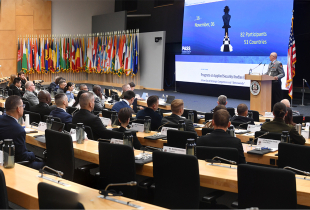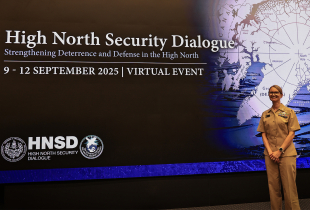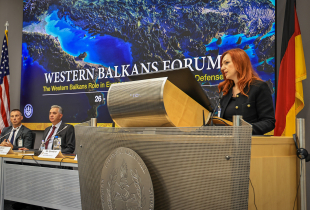
Tbilisi Non-Resident Conference Examines Volatility of Black Sea Region
By James Brooks
Public Affairs Office
George C. Marshall European Center for Security Studies
GARMISCH-PARTENKIRCHEN, Germany (Sept. 12, 2016) – The George C. Marshall European Center for Security Studies and the Ministry of Foreign Affairs Georgia held a “Volatility in the Black Sea Region: Building Resilience and Cooperative Security” conference Sept. 19 and 20 in Tbilisi.
U.S. Ambassador Ian Kelly delivered opening remarks stressing the importance of close cooperation among like-minded countries in this strategically important region, which is undergoing a particularly acute period of turbulence.
This conference was organized by the Marshall Center’s non-resident program directorate. Each year the center hosts more than 40 such conferences throughout Europe.
“The main purpose of this conference was to bring together an interministerial group from countries in the Black Sea region and together identify, review and collaborate on current security issues impacting the region,” said Deputy Dean for Non-Resident Programs German Air Force Colonel Jörg Prescher. “We can shape the security environment through dialogue. I think conference participants recognized the need for dialogue and building networks to strengthen national and common efforts in addressing risks and challenges. You need trust and understanding to fight a huge range of traditional and new transnational threats more effectively.”
More than 50 participants from six countries attended this regional security conference. Majority of the participants work in their countries’ Ministry of Defense and Ministry of Foreign Affairs.
The conference was organized into eight panel discussions covering a wide variety of security challenges in the Black-Sea-Eurasia Region, such as cybersecurity, counter narcotic and illicit trafficking, counterterrorism and transnational crime.
This forum reviewed these current security challenges in the Black Sea and Eurasia region in order to validate, or not, existing approaches. Particular attention was paid to improving our assessments of how the Ukraine crisis and new tensions with Russia continues to influence the region. Together we could discuss adjustments or highlight new strategic policy recommendations. This will enhance our partnerships and network within the region,” said Marshall Center Professor of Transnational Security Studies Graeme Herd.


